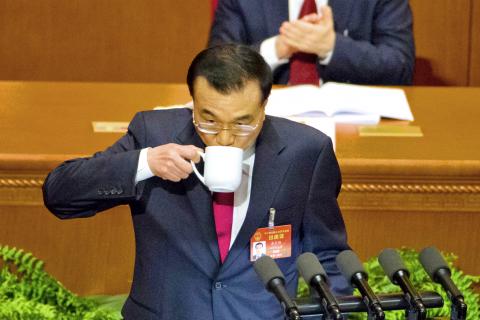China will firmly oppose Taiwanese “separatism,” Chinese Premier Li Keqiang (李克強) said yesterday, following tension with US President Donald Trump over Taiwan, and said that Hong Kong independence moves would “lead nowhere.”
“We will resolutely oppose and contain separatist activities for Taiwan independence,” Li said in a speech opening the annual session of China’s National People’s Congress (NPC) in Beijing.
“We will never tolerate any activity, in any form or name, which attempts to separate Taiwan from the motherland,” he said.

Photo: AP
China will protect national sovereignty and territorial integrity while safeguarding peace and stability, he said.
However, Li extended the usual cautious olive branch across the Taiwan Strait, saying that China would continue efforts to increase linkages with Taiwan, which have included rising cross-strait investment, daily direct flights and increased tourism.
“People on both sides of the Taiwan Strait should keep in mind the greater interests of the nation,” and work toward the “reunification of China,” he said.
In Taipei, the Mainland Affairs Council said the government’s policy to continue and promote peaceful and stable cross-strait development remains unchanged, adding that China should respect and understand Taiwan’s democracy.
Saying peace and stability across the Strait is a mutual responsibility, the council called on the Chinese government to consider the welfare of the people as its priority in policymaking, and reduce maneuvering for political benefit.
Li also shut down any hope of Hong Kong independence.
“The notion of Hong Kong independence will lead nowhere,” he said, adding that Beijing would ensure that the principle of “one country, two systems” is applied in Hong Kong and Macau “without being bent or distorted.”
Li’s annual report to the highly choreographed congress is akin to a state-of-the-nation address highlighting key government priorities for the year, which are then typically parroted in subsequent delegate meetings.
Trump raised eyebrows following his election victory in November last year with a protocol-busting telephone conversation with President Tsai Ing-wen (蔡英文) and later threw doubt on the US “one China” policy, suggesting that the decades-old diplomatic formulation was up for negotiation.
The 10-day NPC session runs until March 15.
Additional reporting by Lin Liang-sheng

Conflict with Taiwan could leave China with “massive economic disruption, catastrophic military losses, significant social unrest, and devastating sanctions,” a US think tank said in a report released on Monday. The German Marshall Fund released a report titled If China Attacks Taiwan: The Consequences for China of “Minor Conflict” and “Major War” Scenarios. The report details the “massive” economic, military, social and international costs to China in the event of a minor conflict or major war with Taiwan, estimating that the Chinese People’s Liberation Army (PLA) could sustain losses of more than half of its active-duty ground forces, including 100,000 troops. Understanding Chinese

The Ministry of Foreign Affairs (MOFA) yesterday said it is closely monitoring developments in Venezuela, and would continue to cooperate with democratic allies and work together for regional and global security, stability, and prosperity. The remarks came after the US on Saturday launched a series of airstrikes in Venezuela and kidnapped Venezuelan President Nicolas Maduro, who was later flown to New York along with his wife. The pair face US charges related to drug trafficking and alleged cooperation with gangs designated as terrorist organizations. Maduro has denied the allegations. The ministry said that it is closely monitoring the political and economic situation

‘SLICING METHOD’: In the event of a blockade, the China Coast Guard would intercept Taiwanese ships while its navy would seek to deter foreign intervention China’s military drills around Taiwan this week signaled potential strategies to cut the nation off from energy supplies and foreign military assistance, a US think tank report said. The Chinese People’s Liberation Army (PLA) conducted what it called “Justice Mission 2025” exercises from Monday to Tuesday in five maritime zones and airspace around Taiwan, calling them a warning to “Taiwanese independence” forces. In a report released on Wednesday, the Institute for the Study of War said the exercises effectively simulated blocking shipping routes to major port cities, including Kaohsiung, Keelung and Hualien. Taiwan would be highly vulnerable under such a blockade, because it

UNRELENTING: China attempted cyberattacks on Taiwan’s critical infrastructure 2.63 million times per day last year, up from 1.23 million in 2023, the NSB said China’s cyberarmy has long engaged in cyberattacks against Taiwan’s critical infrastructure, employing diverse and evolving tactics, the National Security Bureau (NSB) said yesterday, adding that cyberattacks on critical energy infrastructure last year increased 10-fold compared with the previous year. The NSB yesterday released a report titled Analysis on China’s Cyber Threats to Taiwan’s Critical Infrastructure in 2025, outlining the number of cyberattacks, major tactics and hacker groups. Taiwan’s national intelligence community identified a large number of cybersecurity incidents last year, the bureau said in a statement. China’s cyberarmy last year launched an average of 2.63 million intrusion attempts per day targeting Taiwan’s critical